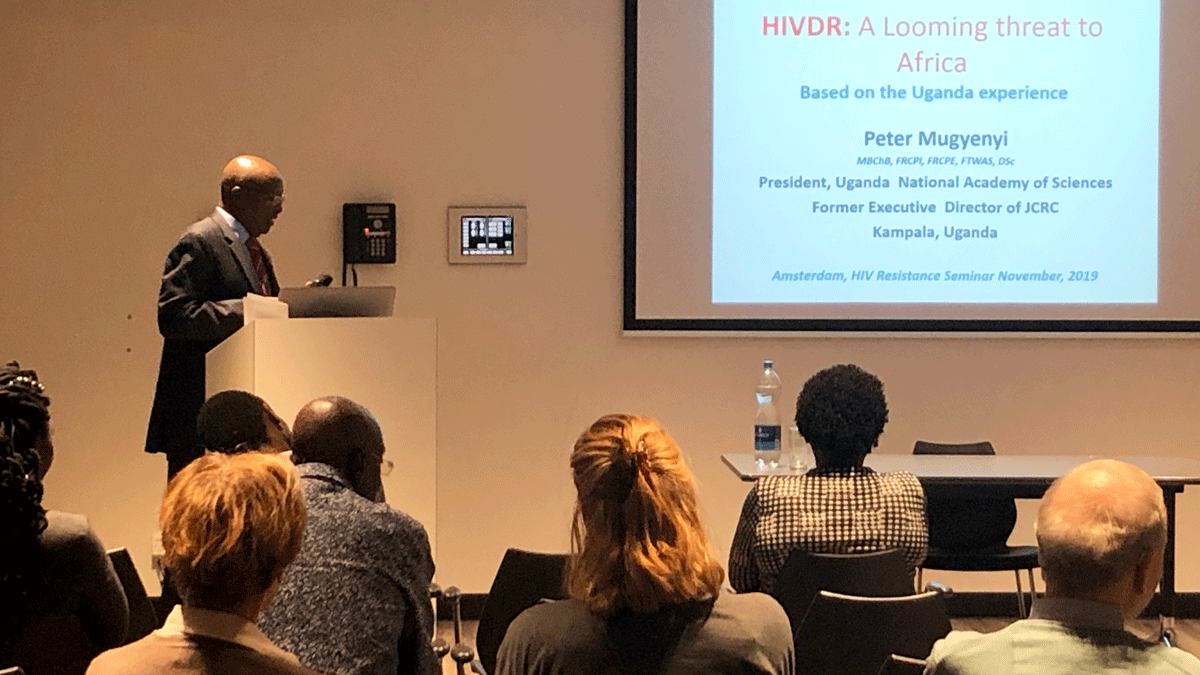
20 Nov Looming threat or Minor detail? A summary of the HIV drug resistance symposium
Just how big of an issue is HIV drug resistance? Do we need to be worried?
A scientific symposium held November 11 at the Amsterdam UMC, sought to answer both of these questions while highlighting the importance of HIV drug resistance from a public health point of view. Facilitated by Prof. Tobias Rinke de Wit, principal investigator on HIV drug resistance projects, the event brought together an expert panel who discussed various facets of this growing public health issue.
AIGHD and PharmAccess, organizations established by late Prof Joep Lange, eminent HIV specialist, have a long history in supporting (implementation) research in the area of HIV treatment in Africa. One important topic is monitoring the emergence of HIV drug resistance on the continent. This is important because HIV drug resistance can jeopardize the international efforts to combat the HIV epidemic.
More than 50 attendees learned about the history of HIV drug resistance, shared through a presentation by scientist, pragmatist and activist Prof. Peter Mugyenyi [featured in story photo]. He was the first director of the Joint Clinical Research Center in Uganda, which was founded in 1991. Peter described the very first attempts in fighting AIDS using HIV drugs in Uganda in the early 1990’s. It was not known that the virus would quickly become resistant and escape. The price Uganda paid was an HIV drug resistance that was three times higher than elsewhere in Africa in 2010.
“People have begun to forget about the impact of this epidemic,” said Prof. Mugyenyi, added that Uganda had the highest HIV prevalence and death rate in the world around that time. “The epidemic is still raging out of control […] and there are many adverse factors that are promoting resistance in Africa. Though there have been many accomplishments, it’s still a big issue.”
Deputy Director of Wits University Reproductive Health and HIV Institute Prof. Francois Venter spoke on Dolutegravir, which has recently been implemented as first-line therapy. Dolutegravir has a very high barrier to drug resistance and therefore is hoped to have a big impact in terms of helping Africa reach the last 90 of the UNAIDS goals: undetectable viral load in 90% of patients on HIV treatment.
Guests also learned about how viruses evolve, by virologist Prof. Charles Boucher and learned the global impact of antimicrobial resistance globally by Prof. Constance Schultsz. Dr. Silvia Bertagnolio, who works in the HIV department at the World Health Organization provided an overview of the WHO guidelines with respect to HIV drug resistance globally and emphasized the important contributions made to WHO data and policy development by AIGHD and PharmAccess through projects led by Prof. Rinke de Wit. Today, Infectious disease elimination and antimicrobial resistance remain two of AIGHD’s research priorities.
“Data from AIGHD and PharmAccess has really contributed to many WHO HIV drug resistance guidelines and reports, it is a very positive collaboration,” she said, adding that the priority moving forward is to continue to work towards preventing resistance.
The event was held in honor of the PhD defenses of candidates Cissy Kityo (Uganda) and Seth Inzaule (Kenya), who were introduced by Dr. Bertagnolio and supervised by Prof. Rinke de Wit. They each presented on their respective research; Cissy’s being Emerging HIV Drug Resistance in sub-Saharan Africa: Effects on Treatment Outcomes and Seth’s thesis titled Towards Achieving the third ‘90’ of the 90-90-90 Global HIV targets in Sub-Saharan Africa.
For Cissy, the event was particularly meaningful: one of her patients, Moses “Supercharger” Nsubuga, presented at the event and shared one of his music videos. Moses was diagnosed with HIV in 1994 and became resistant to first-line treatment. He was sent home in the back of a pick-up truck to die when he met Dr. Cissy, who was working as a HIV physician at the Joint Clinical Research Center. She, along with Dr. Mugyenyi, placed Moses on second-line treatment, which saw his health drastically improve. He now tours the world sharing his story of living with HIV and the importance of understanding and getting ahead of HIV drug resistance. Moses has become an international HIV drug resistance Ambassador.
“HIV drug resistance continues to be a growing problem and the speakers in this symposium helped provide insight into the ongoing epidemic, current challenges and offered ways we can address it before resistance threatens the progress we’ve made globally in combating HIV,” said Prof. Rinke de Wit.
“Resistance impacts twice as many women than men and nearly half of all babies born with HIV will develop HIV drug resistance before their second birthday. These numbers are sobering and a realization that there is much more work that needs to be done.”
